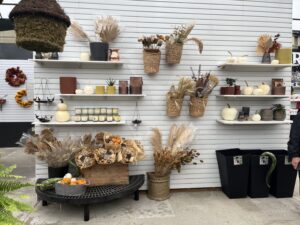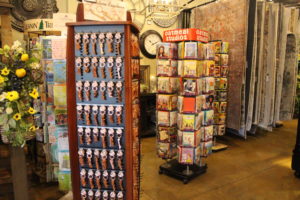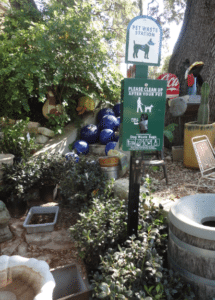The Ties that Bind
The times have changed since that hopeful November of 1975, when Vivien Jennings, founder and president of Rainy Day Books, Inc., opened what was then a recycled paperback bookstore in Fairway, Kan. The cozy 450-square-foot booklover’s refuge, tucked away in a corner of a high-end strip mall, just kept growing, moving three times within the same mall over the years. With each move, Rainy Day Books took over a larger space, eventually beating out Starbucks for the coveted anchor spot (but we’ll get to that later).
Along the way, the independent bookstore gained the community’s loyalty and a national reputation. Rainy Day Books is now a top destination for many of the country’s best-selling authors and was hailed as “the gold standard” among independent bookstores by Publishers Weekly a few years ago.
Chapter I: A New Playing Field
At a time when many independent bookstores struggle to stay afloat as yet another Barnes & Noble or Borders pops up around the corner, Rainy Day Books keeps thriving. But it hasn’t been easy, Jennings says. With the proliferation of chain bookstores like the trailblazing Waldenbooks in the ’80s and the entrance of online powerhouse Amazon.com, the playing field changed drastically. As chains like Waldenbooks hit the market, “they soon realized that they couldn’t compete with independents on knowledge or service,” so they started employing retail techniques like heavy discounting, Jennings says. “It brought a whole new dimension to our business.”
“For years, the book business was not hardcore retail, it was the book business,” she says. “Gradually, we have become very serious retailers. There’s a lot of volatility in our business now, and a lot of challenges. The people who are independent in our business have a passion for it or they wouldn’t be here.”
Sound familiar? Just like garden centers contend with the Home Depot or Lowe’s down the street, independent bookstores battle it out with the big franchises (Barnes & Noble, Borders and company) every day. Many have floundered over the years in the face of such competition. Those that persevered, however, are managing to remain true to their core while adapting to a new game. Independents like Rainy Day Books distinguish themselves from the pack by offering customers a personal touch, building ties with the community, thinking (and acting!) creatively and, most importantly, celebrating books and the special role they play in people’s lives. And Rainy Day Books, at least, is in it for the long haul. “It’s a challenge every single day. I don’t think it’s going to stop,” Jennings says. “But we’re determined we’re going to be as creative as needed to keep doing what we love.”
Chapter II: A Personal Touch
These days, Rainy Day Books might be big (with 2,500 square feet of retail space upstairs and a 3,000-square-foot “drive-in” basement where they hold their almost daily events and staff offices) but its feel remains purposefully personal. Everyone on the staff works hard to build personal relationships with customers, Jennings says. They know their regulars’ reading likes and dislikes, are always available to answer questions and recommend titles, and treat their customers’ time with the respect it deserves.
By refusing to treat books as commodities, as many large retailers do, Rainy Day Books strives to stand out from the rest. “Our position has to be that [books] are not soap or shampoo,” Jennings says. “It’s something special, wonderful, individual that has an emotional connection to customers. Reading is personal, and that is the approach we’re taking to it.”
Carmichael’s Bookstore, with two locations in Louisville, Ky., also prides itself on providing that personal touch. Customers looking for a knowledgeable staff that provides personal service and their handpicked selections have come to trust the cozy, quaint literary haven. Before opening an independent bookstore in Louisville in the late 1970s, co-owners and founders Carol Besse and Michael Boggs (hence the name Carmichael’s) learned the independent ropes in Chicago. They both worked at the popular Barbara’s Bookstores, over time climbing their way up to the top of the organization. “We got to the top, looked around and asked ourselves, ‘What’s next?'” recalls Besse. The answer was opening up their own bookstore in Louisville, Ky., Michael’s home state. At the time, this type of “neighborhood” bookstore did not exist in Louisville, Besse says.
By putting in the time to get to know their customers, Carmichael’s has been able to build a specifically tailored selection that reflects their customers’ interests while still managing to surprise once in a while. “The selection process…is essential to the character of the bookstore. That’s what really sets us apart. Over the years, we’ve grown to know our customers and they have grown to trust us to have the books they want,” she says.
Chapter III: It Takes a Village
Both Carmichael’s and Rainy Day Books, Inc. say their success is rooted in the support of the community. In fact, it was the outpouring and very vocal support of the community that convinced the Fairway Shops’ management to rent the shopping center’s prime spot to an independent bookstore instead of the Starbucks that wanted to move in. “Unbeknownst to me, members of the community all over the metropolitan area contacted the landlords, saying, ‘We want Rainy Day Books to have more room, and we want them to stay.’ It was really heartwarming to know,” Jennings says.
As important as it is to develop relationships with the store’s customers, she works just as hard to “create a synergy” with local retailers and organizations. They also donate to charitable organizations. “We’re very visible in the community,” she says. “Years ago, we decided we would not be defined by our geography. We decided our bricks and mortar were only part of our business. We would go out where the customers were and meet them on that ground.”
In fact, Jennings’ business partner, Roger Doeren, tapped into his engineering education to set up a system where the bookstore can “be virtual wherever we go,” she says. They use a battery-operated cashier and a “cellular credit card capture” that doesn’t require phone lines. They also have a fully operational van ready to go out.
Rainy Day Books’ well-known author events routinely feature the biggest literary names, drawing anywhere from 200 to 1,200 attendees, she says. Due to the size of the crowds, many of the events take place off-site, which helps drive traffic to other local venues.
And to Jennings, every person she encounters is a potential business partner: “You have to always be open, always be thinking: ‘How can we work together?'”
Chapter IV: The Creative Route
Instead of worrying about shrinking profit margins, Jennings suggests letting your creative juices flow. “Think about the [customer] you’re trying to attract. Most independents can’t go the low-price route; we can’t compete in that arena,” she says. Instead, try to make your customers’ experience in your store memorable and spend quality time with people who are enthusiastic about what you do and understand the value of the service you’re offering, she says.
And when opportunity knocks be it a chance encounter with a local chef that might be willing to host your next “Meet the Author” dinner or cater your upcoming container gardening workshop never be afraid to open the door, she says. “To me, that’s what keeps it fun. It’s exploring new opportunities, new alliances, new ideas,” Jennings says.
Chapter V: A Swinging Pendulum
When Carmichael’s first opened, there weren’t any chain bookstores to worry about in Louisville. “Now there are four Borders, two Barnes & Nobles,” Besse says. “The chains are here, but we had established our reputation before they came in.”
Despite the heavy competition, the self-proclaimed bookworm looks to the future with optimism, pointing to the “buy-local movement” erupting across the country as a sign that the tide is turning in favor of independents. “The pendulum has really just swung in both directions as far as the industry goes. Now that pendulum is swinging back in our direction,” Besse says. “People are beginning to understand what it means to buy local, what it means to the community to keep money invested in the local town.”
As independent retailers, whether you stock bestselling perennials or bestselling mystery novels, the challenge is the same: to keep offering customers high-quality goods and a personal shopping experience while competing with the big boxes’ discount prices and marketing prowess. The game has changed, but you don’t necessarily have to play by big box rules. Customers hold a special place in their hearts for plants and books and they are likely to invest in a business they know shares their passion. It’s up to you to sell your story.


















 Videos
Videos





